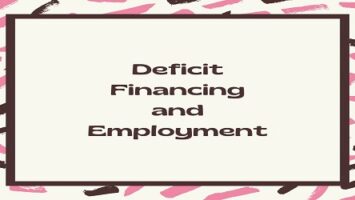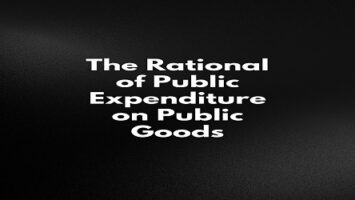Table of Contents
Comparative Study of War and Development Finance:
It is worthwhile to make a comparative study of the problems of War Finance and Developmental Finance since they are similar to each other in some respects and are different in some other respects. Let us compare the problems of Developmental Finance with that of War Finance.
Similarities:
In the first place, it has been observed that a huge amount of financial resources are needed both for financing war and the economic development of a country.
Secondly, the tools used for raising resources in war times as well as in peacetime are the same. Taxation, borrowing, and deficit financing are important tools or methods both for financing public expenditure in war times and developmental expenditure in peacetime.
Thirdly, when resources are raised both for financing war and economic development, they impose an economic burden upon the community, since resources can be raised by reducing the consumption of the people or depriving the community of a certain amount of commodities. In other words, when resources are diverted from private use to public use whether in peacetime or in wartime, they impose an economic burden upon the community depriving it of a certain amount of consumption.
Fourthly, economic disparities may be generated both during the process of economic development and during the period of war. For instance, economic disparities have enlarged between big and small agriculturists during the process of economic development, since big agriculturists have taken more benefits from agricultural institutions and government schemes for the development of agriculture as compared to small agriculturists. Again, businessmen may earn huge profits in times of war because of shortages of consumer goods and controls, and thus economic disparities may be generated.
Dis-similarities:
(1) Finance for War and Economic Development differ in their Importance- It is difficult to consider any single factor as the prime mover in the process of economic development. Development-conscious people with reasonably abundant natural resources, spirited enterprise, a technically trained labor force, and dedicated civil service are the essential requirements for achieving rapid economic development. But, capital formation or mobilization of financial resources is fundamental to the whole problem of economic development. It means that the mobilization of financial resources is of prime importance for the rapid economic development of an underdeveloped country.
As against this, money does not win wars. Wars are won by men and materials by having the right kinds and quantities of men trained for the right jobs and equipped with the right materials in the right places at the right times. If men and the materials do not exist or are mobilized for war, then money cannot create them or turn a plow share into a sword overnight. And on the other hand, if a country has more well-trained men than enemies, more equipment, and more raw materials to replenish its stocks and feed its people, even the most appalling financial bungles can hardly prevent it from winning the war. Thus, finance is not the primary sinews of war. In order of war-time importance, it ranks after the provision of men and materials.
(2) Difference in Objective of War Finance and Economic Development- The purpose of war finance is to divert resources from private use to public use so as to provide man and material, to win the war, without causing any disturbance to the framework of the society. While the purpose of development finance is to raise resources for increasing the rate of capital accumulation in the public sector and to promote the growth of capital accumulation in the private sector by building economic social overheads or infrastructure.
(3) Nature of War Development Finance- Development Finance is productive in nature, while war finance is unproductive. It means, when financial resources are mobilized for making economic development of the country they are expected to raise the national income and per capita income of the country. It increases the growth of output per head of population. Thus, it increases the real consumption level of the masses, the standard of living, and the economic welfare of the entire community. Contrary to this, when resources are utilized for war purposes, it reduces the level of consumption of the masses, and available output per head of population for private consumption, and thus, reduces the standard of living and economic welfare of the entire community. Besides, war finance may also have adverse effects on health and efficiency, while development finance possesses favorable effects on the health and efficiency of the masses.
(4) Economic Development is a Long-term Phenomenon while War Finance is Short-term- Economic development is a continuous process where the real national income of an economy increases over a long period of time. It means economic development is a long-term process, in which financial resources are utilized to raise the per capita income, output, and economic welfare of the nation at an accelerated rate. Economic development attempts to achieve a stage of self-sustained growth. While war finance is a short-term phenomenon in which resources, are diverted from private use to public use for the period when a country is at war.
Besides, the objective of economic development is not only to increase per capita income and output, but it also aims to remove economic disparities. While war finance only aims to mobilize resources so as to win the war.
(5) Taxation for Economic Development and for Financing War- Taxation is used as an instrument of fiscal policy for raising resources both for economic development and war purposes. But the mobilization of resources through taxation for economic development in underdeveloped countries is a difficult task since the level of per capita income in those countries is very low. Thus, Dillard said that “In peacetime, they would adversely react to high tax rates for the existing standard of living is already low so that high tax rates will not be conducive to economic development. The political and social atmosphere in peacetime is much less favorable for high taxes than in wartime.” Besides, indirect taxes, such as sales tax and excise duties are regressive in effect, i.e., they all fall more heavily on the poor and hence, they are not considered desirable in a poor country; while it is not worthwhile to levy direct taxes such as income tax and wealth on the majority of individuals; since the cost of collection is too high in proportion of the yield.
Hence, it is administratively not feasible to rely on such taxes in a poor country. In addition to it, a high rate of taxation discourages savings, investments, and incentives. Thus, sufficient resources can not be mobilized from taxation for the economic development of the country.
However, in times of war, taxation may not be opposed by the people because of the feeling of patriotism, but it is humanly not possible to finance a totalitarian war entirely out of taxation. All that can be done is to increase the rate of taxation and it can be pushed to the extent it avoids inflation as a result of expenditure for war purposes. However, raising resources from taxation during wartime is easier as compared to peacetime. Thus, war taxes, both on the rich and on the poor, can go much further than peace.
(6) Borrowing for Financing Economic Development and War- Economic effect of borrowing is exactly the same as that of taxation. Money is taken out of the pocket of the public and transferred to the Government. The Choice between different methods of finance is thus, not only between methods that impose a greater are less burden or sacrifice of consumption on the people, the amount of sacrifice is fixed, not by finance, but by technical factors such as the number of drafted male into the armed forces, ammunition factories, and by the volume of material that is required to equip and supply them.
However, voluntary boring from the public in times of war is easy as compared to borrowing for purposes of economic development.
Consumers may deliberately reduce their consumption to purchase government bonds because of a feeling of patriotism and the temporary nature of the sacrifice involved. An individual would not resent to lending so bitterly as to taxation if, in exchange for his sacrifice of income, he receives a title to wealth and a yearly payment of interest. But borrowing would increase the cost of war as well as the burden of repaying the loans along with interest in the post-war period. Though loans try to solve the current financial problems of war, they create problems for the future, as they are unproductive in nature. Therefore, they leave a heavy burden on future generations.
Unlike war borrowing which is unproductive, borrowing for investment in development projects, leads to the building up of assets which yield returns to the economy. If the borrowed funds are used for asset-creating public projects, the income of the nation is bound to rise along with the rise in government obligations. The cost or the burden should be offset by the benefits that the debit creation confers. Thus borrowing for development purposes is fundamentally different from borrowing for war purposes.
(7) Deficit Financing for Economic Development and War- In addition to the normal methods of obtaining resources, the government may resort to deficit financing both for the purposes of financing war expenditure as well as for financing the economic development of a country. Deficit financing results in the net addition of the currency without a corresponding increase in the supply of goods and services. Thus, it leads to a rise in prices or inflation. Inflation lefts people spending as much as before but sees that they get less. Thus, it also reduces the consumption of the masses. But the effect of deficit financing for the purpose of war is different from that of which is used for financing economic development.
If deficit financing is undertaken for the purpose of creating useful capital goods, even if it leads to mild inflation at a certain stage, it is ultimately self-destructive. Besides, if it is used for increasing the output of consumer goods or wage goods, it may not be inflationary as the additionally created purchasing power will be matched by an increase of such goods.
But, deficit financing for the purpose of financing war expenditure results in inflation. Price inflation may lead to cost inflation as well as wage inflation when price rise more rapidly than the income of some of the groups in the community.
Thus there is a striking unanimity among all sections of opinion that inflation is a disastrous method of financing a war that must at all costs be avoided.
Contrary to this, deficit financing has been considered an important tool for financing development expenditures. Though deficit financing is considered undesirable on many grounds, it becomes unavoidable to go without deficit financing for financing war as well as developmental expenditure.









Comments (No)